Sport + Physical Activity as a reflection of


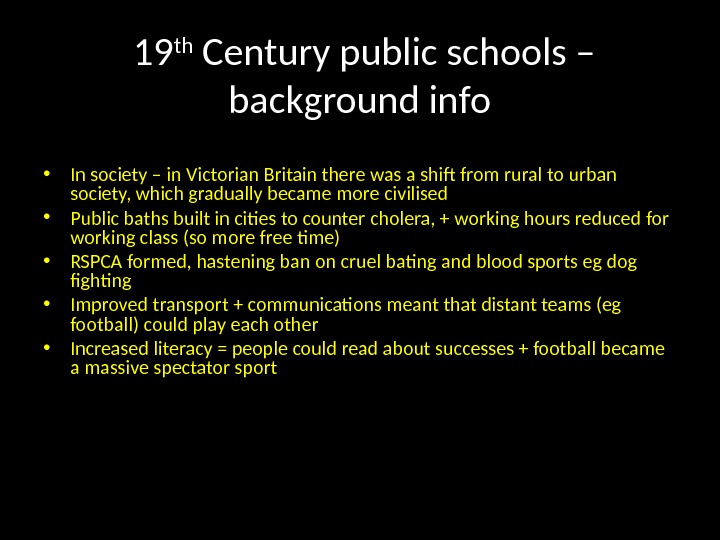
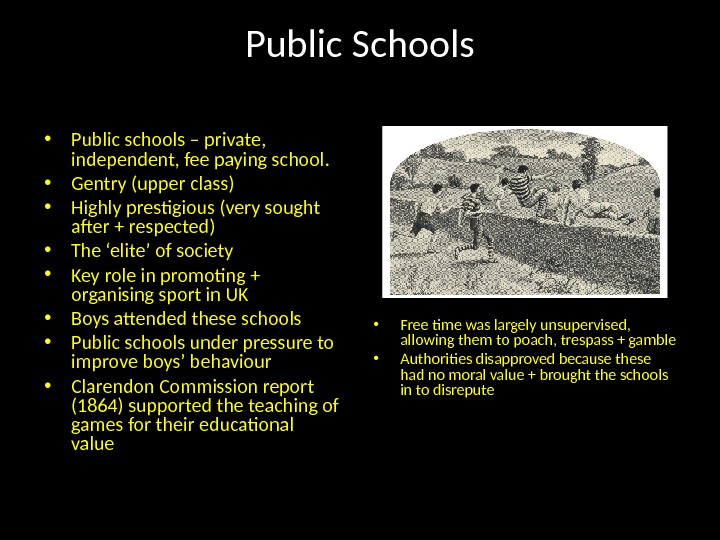
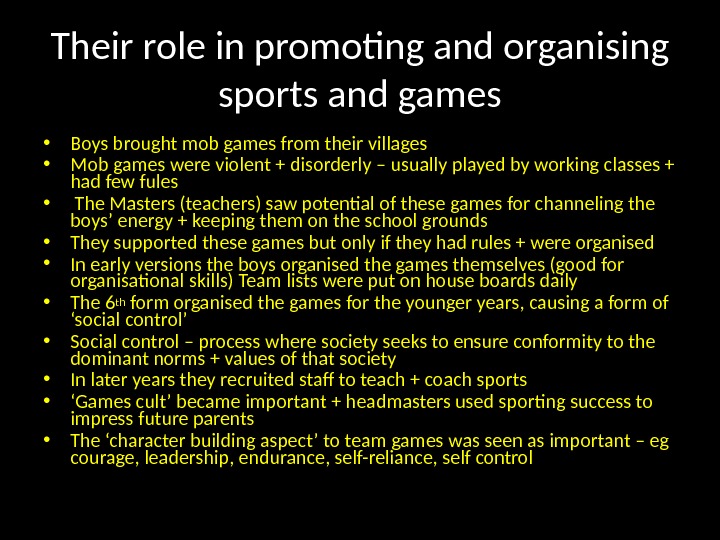
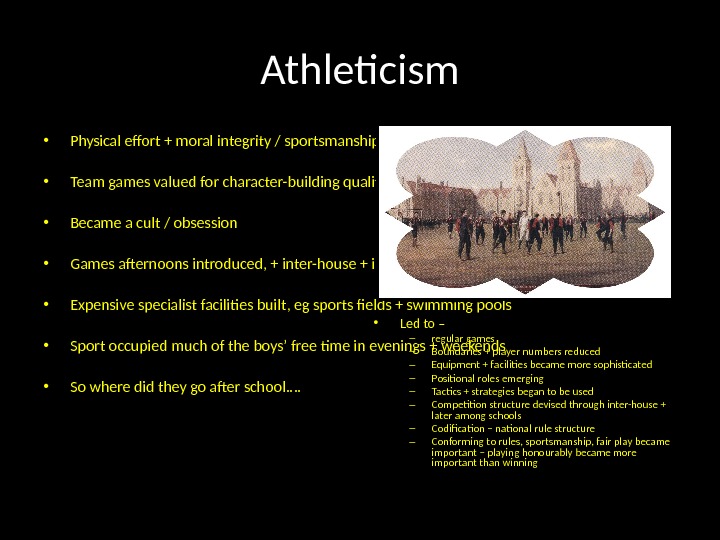



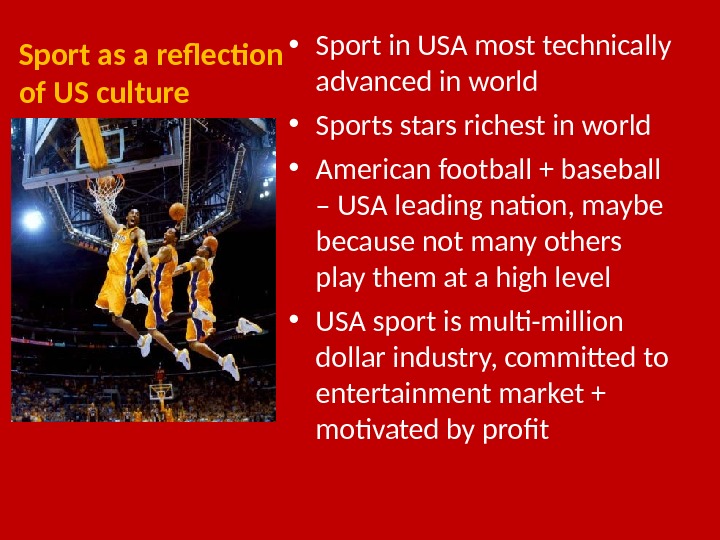
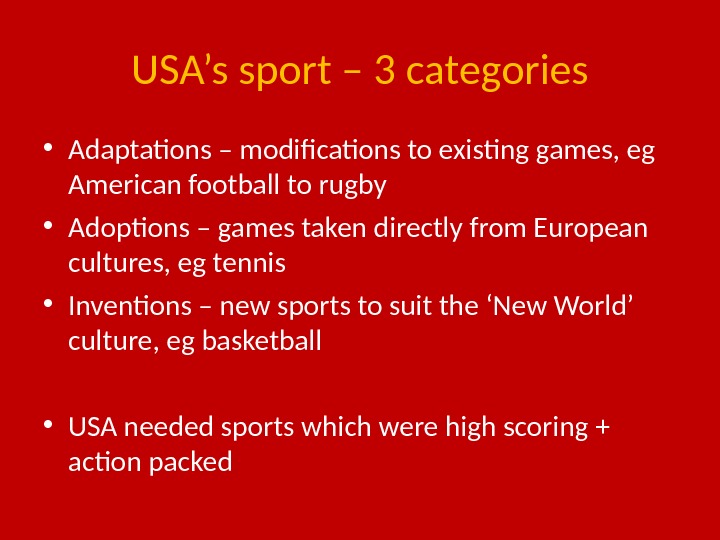
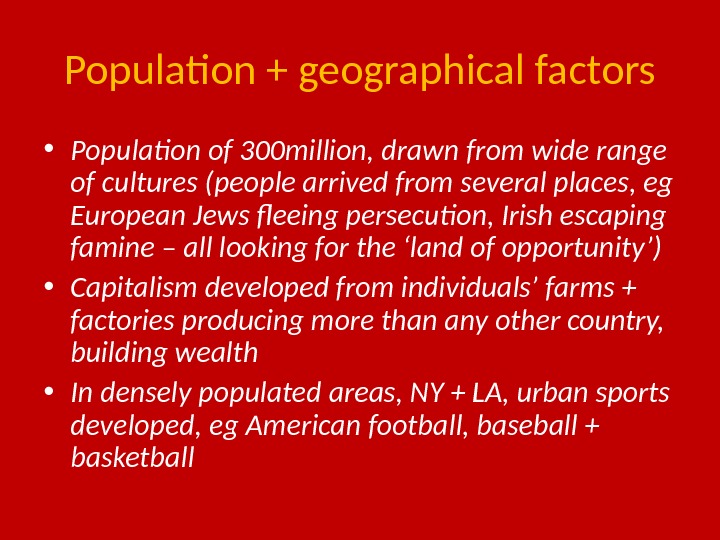

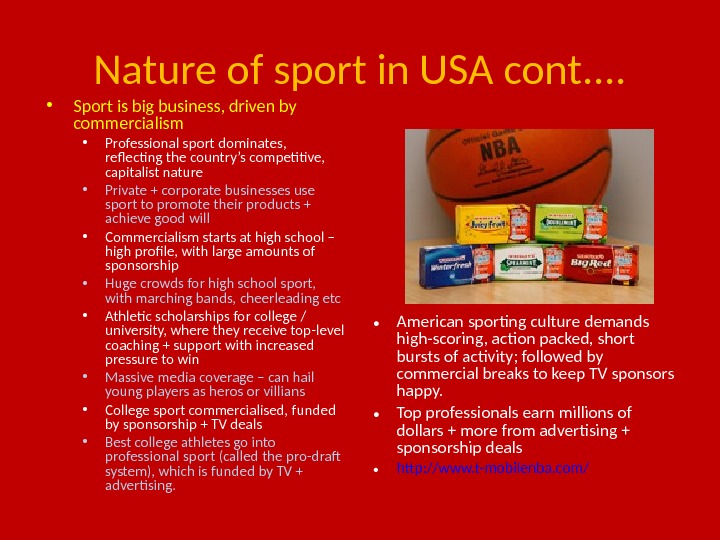
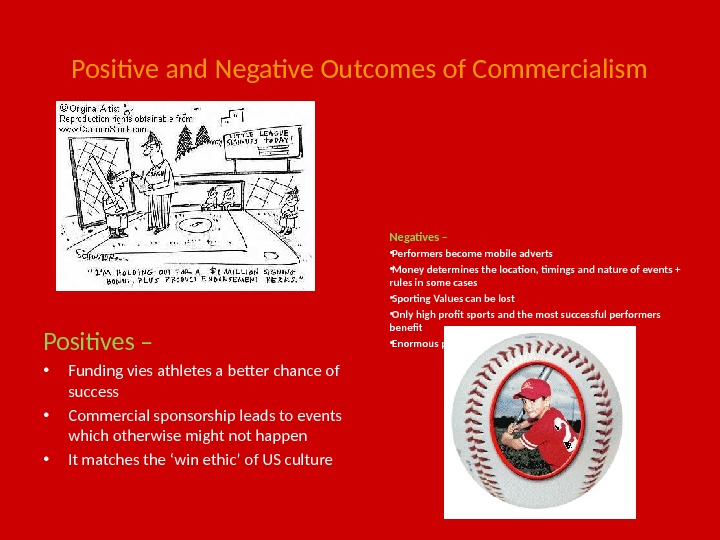
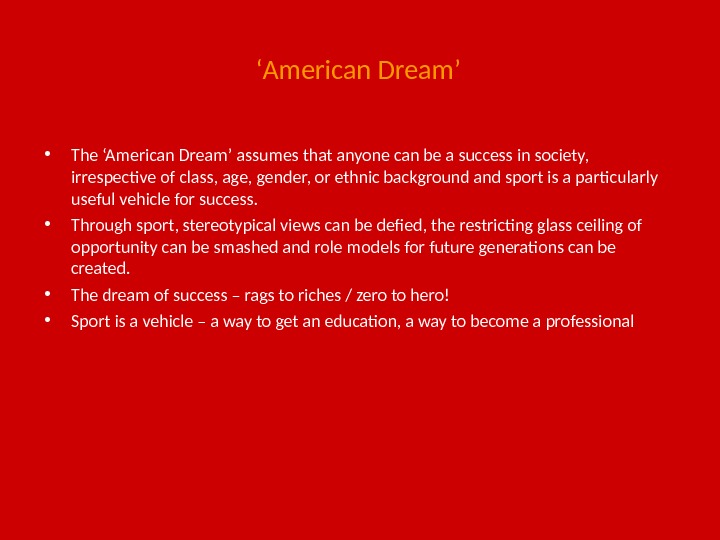

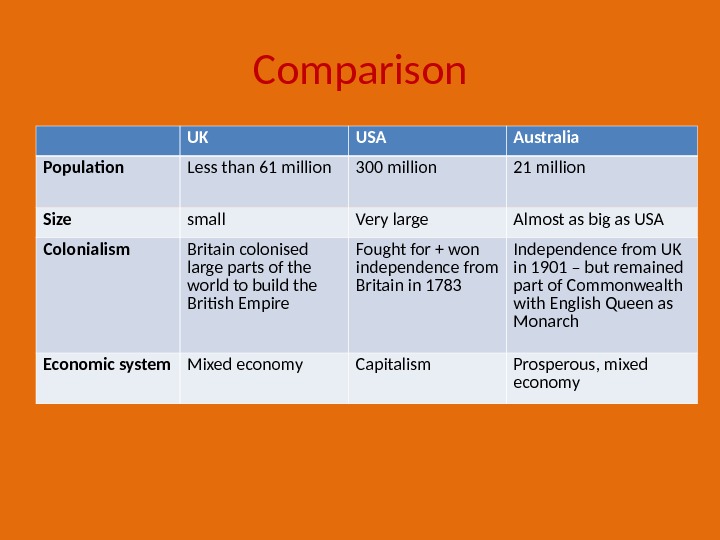
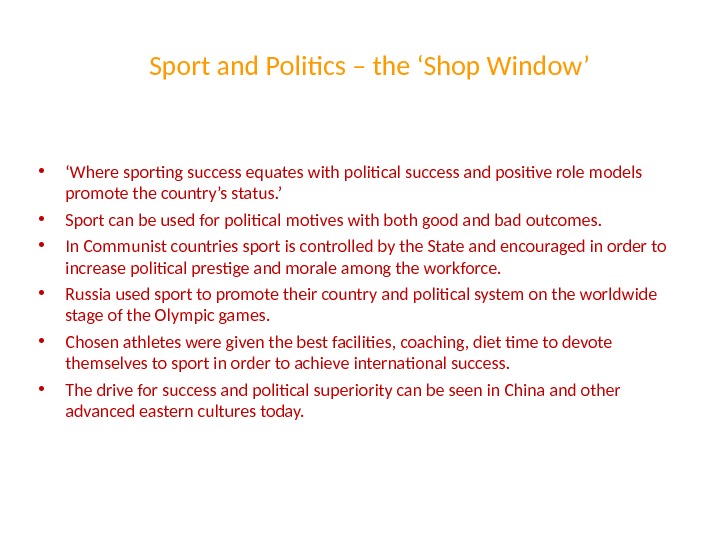

as_united_kingdom._usa._australia.ppt
- Размер: 2.3 Mегабайта
- Количество слайдов: 19
Описание презентации Sport + Physical Activity as a reflection of по слайдам
 Sport + Physical Activity as a reflection of the culture in which it exists The United Kingdom The USA Australia
Sport + Physical Activity as a reflection of the culture in which it exists The United Kingdom The USA Australia
 19 th Century public schools – background info • In society – in Victorian Britain there was a shift from rural to urban society, which gradually became more civilised • Public baths built in cities to counter cholera, + working hours reduced for working class (so more free time) • RSPCA formed, hastening ban on cruel bating and blood sports eg dog fighting • Improved transport + communications meant that distant teams (eg football) could play each other • Increased literacy = people could read about successes + football became a massive spectator sport
19 th Century public schools – background info • In society – in Victorian Britain there was a shift from rural to urban society, which gradually became more civilised • Public baths built in cities to counter cholera, + working hours reduced for working class (so more free time) • RSPCA formed, hastening ban on cruel bating and blood sports eg dog fighting • Improved transport + communications meant that distant teams (eg football) could play each other • Increased literacy = people could read about successes + football became a massive spectator sport
 Public Schools • Free time was largely unsupervised, allowing them to poach, trespass + gamble • Authorities disapproved because these had no moral value + brought the schools in to disrepute • Public schools – private, independent, fee paying school. • Gentry (upper class) • Highly prestigious (very sought after + respected) • The ‘elite’ of society • Key role in promoting + organising sport in UK • Boys attended these schools • Public schools under pressure to improve boys’ behaviour • Clarendon Commission report (1864) supported the teaching of games for their educational value
Public Schools • Free time was largely unsupervised, allowing them to poach, trespass + gamble • Authorities disapproved because these had no moral value + brought the schools in to disrepute • Public schools – private, independent, fee paying school. • Gentry (upper class) • Highly prestigious (very sought after + respected) • The ‘elite’ of society • Key role in promoting + organising sport in UK • Boys attended these schools • Public schools under pressure to improve boys’ behaviour • Clarendon Commission report (1864) supported the teaching of games for their educational value
 Their role in promoting and organising sports and games • Boys brought mob games from their villages • Mob games were violent + disorderly – usually played by working classes + had few fules • The Masters (teachers) saw potential of these games for channeling the boys’ energy + keeping them on the school grounds • They supported these games but only if they had rules + were organised • In early versions the boys organised the games themselves (good for organisational skills) Team lists were put on house boards daily • The 6 th form organised the games for the younger years, causing a form of ‘social control’ • Social control – process where society seeks to ensure conformity to the dominant norms + values of that society • In later years they recruited staff to teach + coach sports • ‘ Games cult’ became important + headmasters used sporting success to impress future parents • The ‘character building aspect’ to team games was seen as important – eg courage, leadership, endurance, self-reliance, self control
Their role in promoting and organising sports and games • Boys brought mob games from their villages • Mob games were violent + disorderly – usually played by working classes + had few fules • The Masters (teachers) saw potential of these games for channeling the boys’ energy + keeping them on the school grounds • They supported these games but only if they had rules + were organised • In early versions the boys organised the games themselves (good for organisational skills) Team lists were put on house boards daily • The 6 th form organised the games for the younger years, causing a form of ‘social control’ • Social control – process where society seeks to ensure conformity to the dominant norms + values of that society • In later years they recruited staff to teach + coach sports • ‘ Games cult’ became important + headmasters used sporting success to impress future parents • The ‘character building aspect’ to team games was seen as important – eg courage, leadership, endurance, self-reliance, self control
 Athleticism • Physical effort + moral integrity / sportsmanship • Team games valued for character-building qualities • Became a cult / obsession • Games afternoons introduced, + inter-house + inter-school fixtures regularly played • Expensive specialist facilities built, eg sports fields + swimming pools • Sport occupied much of the boys’ free time in evenings + weekends • So where did they go after school…. • Led to – – regular games – Boundaries + player numbers reduced – Equipment + facilities became more sophisticated – Positional roles emerging – Tactics + strategies began to be used – Competition structure devised through inter-house + later among schools – Codification – national rule structure – Conforming to rules, sportsmanship, fair play became important – playing honourably became more important than winning
Athleticism • Physical effort + moral integrity / sportsmanship • Team games valued for character-building qualities • Became a cult / obsession • Games afternoons introduced, + inter-house + inter-school fixtures regularly played • Expensive specialist facilities built, eg sports fields + swimming pools • Sport occupied much of the boys’ free time in evenings + weekends • So where did they go after school…. • Led to – – regular games – Boundaries + player numbers reduced – Equipment + facilities became more sophisticated – Positional roles emerging – Tactics + strategies began to be used – Competition structure devised through inter-house + later among schools – Codification – national rule structure – Conforming to rules, sportsmanship, fair play became important – playing honourably became more important than winning
 Teachers Industrialists Parents Community Leaders. Community members. Army Officers Vicars / priests
Teachers Industrialists Parents Community Leaders. Community members. Army Officers Vicars / priests
 Move from the amateur approach to professional approach • Traditionally sport in UK organised by volunteers, unpaid coaches + administrators • So amateur approach + lack of expertise = inconsistency + ineffectiveness • Recently, there is a shift towards more business-like approach • Support + interest from government increased towards end of 20 th Century, especially since the 2012 bid • Government set up Department of Culture, Media + Sport. They appointed a Minister for Sport + give grants to UK Sport + home country Sports Councils.
Move from the amateur approach to professional approach • Traditionally sport in UK organised by volunteers, unpaid coaches + administrators • So amateur approach + lack of expertise = inconsistency + ineffectiveness • Recently, there is a shift towards more business-like approach • Support + interest from government increased towards end of 20 th Century, especially since the 2012 bid • Government set up Department of Culture, Media + Sport. They appointed a Minister for Sport + give grants to UK Sport + home country Sports Councils.
 • Government wants international sporting success, so employed full-time, paid administrators in NGBs, especially well-funded sports like football, cricket + rugby • Performance is related to funding, filtering through UK Sport to NGBs + performers • Some NGBs now have performance directors, concentrating on excellence, world titles + gold medals • UK Sport is responsible for sporting excellence
• Government wants international sporting success, so employed full-time, paid administrators in NGBs, especially well-funded sports like football, cricket + rugby • Performance is related to funding, filtering through UK Sport to NGBs + performers • Some NGBs now have performance directors, concentrating on excellence, world titles + gold medals • UK Sport is responsible for sporting excellence
 Sport as a reflection of US culture • Sport in USA most technically advanced in world • Sports stars richest in world • American football + baseball – USA leading nation, maybe because not many others play them at a high level • USA sport is multi-million dollar industry, committed to entertainment market + motivated by profit
Sport as a reflection of US culture • Sport in USA most technically advanced in world • Sports stars richest in world • American football + baseball – USA leading nation, maybe because not many others play them at a high level • USA sport is multi-million dollar industry, committed to entertainment market + motivated by profit
 USA’s sport – 3 categories • Adaptations – modifications to existing games, eg American football to rugby • Adoptions – games taken directly from European cultures, eg tennis • Inventions – new sports to suit the ‘New World’ culture, eg basketball • USA needed sports which were high scoring + action packed
USA’s sport – 3 categories • Adaptations – modifications to existing games, eg American football to rugby • Adoptions – games taken directly from European cultures, eg tennis • Inventions – new sports to suit the ‘New World’ culture, eg basketball • USA needed sports which were high scoring + action packed
 Population + geographical factors • Population of 300 million, drawn from wide range of cultures (people arrived from several places, eg European Jews fleeing persecution, Irish escaping famine – all looking for the ‘land of opportunity’) • Capitalism developed from individuals’ farms + factories producing more than any other country, building wealth • In densely populated areas, NY + LA, urban sports developed, eg American football, baseball + basketball
Population + geographical factors • Population of 300 million, drawn from wide range of cultures (people arrived from several places, eg European Jews fleeing persecution, Irish escaping famine – all looking for the ‘land of opportunity’) • Capitalism developed from individuals’ farms + factories producing more than any other country, building wealth • In densely populated areas, NY + LA, urban sports developed, eg American football, baseball + basketball
 Nature of sport in USA • Reflects US culture of win ethic • Mainstream competitive culture has acquired the term Lombardianism, after American football coach Vince Lombardi who said, “Winning isn’t everything – it’s the only thing. ” Failure in sport is not an option • 100% commitment needed – even when injured / drug use – win at all costs
Nature of sport in USA • Reflects US culture of win ethic • Mainstream competitive culture has acquired the term Lombardianism, after American football coach Vince Lombardi who said, “Winning isn’t everything – it’s the only thing. ” Failure in sport is not an option • 100% commitment needed – even when injured / drug use – win at all costs
 Nature of sport in USA cont. . • Sport is big business, driven by commercialism • Professional sport dominates, reflecting the country’s competitive, capitalist nature • Private + corporate businesses use sport to promote their products + achieve good will • Commercialism starts at high school – high profile, with large amounts of sponsorship • Huge crowds for high school sport, with marching bands, cheerleading etc • Athletic scholarships for college / university, where they receive top-level coaching + support with increased pressure to win • Massive media coverage – can hail young players as heros or villians • College sport commercialised, funded by sponsorship + TV deals • Best college athletes go into professional sport (called the pro-draft system), which is funded by TV + advertising. • American sporting culture demands high-scoring, action packed, short bursts of activity; followed by commercial breaks to keep TV sponsors happy. • Top professionals earn millions of dollars + more from advertising + sponsorship deals • http: //www. t-mobilenba. com/
Nature of sport in USA cont. . • Sport is big business, driven by commercialism • Professional sport dominates, reflecting the country’s competitive, capitalist nature • Private + corporate businesses use sport to promote their products + achieve good will • Commercialism starts at high school – high profile, with large amounts of sponsorship • Huge crowds for high school sport, with marching bands, cheerleading etc • Athletic scholarships for college / university, where they receive top-level coaching + support with increased pressure to win • Massive media coverage – can hail young players as heros or villians • College sport commercialised, funded by sponsorship + TV deals • Best college athletes go into professional sport (called the pro-draft system), which is funded by TV + advertising. • American sporting culture demands high-scoring, action packed, short bursts of activity; followed by commercial breaks to keep TV sponsors happy. • Top professionals earn millions of dollars + more from advertising + sponsorship deals • http: //www. t-mobilenba. com/
 Positive and Negative Outcomes of Commercialism Positives – • Funding vies athletes a better chance of success • Commercial sponsorship leads to events which otherwise might not happen • It matches the ‘win ethic’ of US culture Negatives – • Performers become mobile adverts • Money determines the location, timings and nature of events + rules in some cases • Sporting Values can be lost • Only high profit sports and the most successful performers benefit • Enormous pressure to win
Positive and Negative Outcomes of Commercialism Positives – • Funding vies athletes a better chance of success • Commercial sponsorship leads to events which otherwise might not happen • It matches the ‘win ethic’ of US culture Negatives – • Performers become mobile adverts • Money determines the location, timings and nature of events + rules in some cases • Sporting Values can be lost • Only high profit sports and the most successful performers benefit • Enormous pressure to win
 ‘ American Dream’ • The ‘American Dream’ assumes that anyone can be a success in society, irrespective of class, age, gender, or ethnic background and sport is a particularly useful vehicle for success. • Through sport, stereotypical views can be defied, the restricting glass ceiling of opportunity can be smashed and role models for future generations can be created. • The dream of success – rags to riches / zero to hero! • Sport is a vehicle – a way to get an education, a way to become a professional
‘ American Dream’ • The ‘American Dream’ assumes that anyone can be a success in society, irrespective of class, age, gender, or ethnic background and sport is a particularly useful vehicle for success. • Through sport, stereotypical views can be defied, the restricting glass ceiling of opportunity can be smashed and role models for future generations can be created. • The dream of success – rags to riches / zero to hero! • Sport is a vehicle – a way to get an education, a way to become a professional
 Compare American Football + Aussie Rules Football American Football • Origins • Nature of the sport • Violence Australian Rules Football • Origins • Factors shaping its development • Commercialism + impact of the media
Compare American Football + Aussie Rules Football American Football • Origins • Nature of the sport • Violence Australian Rules Football • Origins • Factors shaping its development • Commercialism + impact of the media
 Comparison UK USA Australia Population Less than 61 million 300 million 21 million Size small Very large Almost as big as USA Colonialism Britain colonised large parts of the world to build the British Empire Fought for + won independence from Britain in 1783 Independence from UK in 1901 – but remained part of Commonwealth with English Queen as Monarch Economic system Mixed economy Capitalism Prosperous, mixed economy
Comparison UK USA Australia Population Less than 61 million 300 million 21 million Size small Very large Almost as big as USA Colonialism Britain colonised large parts of the world to build the British Empire Fought for + won independence from Britain in 1783 Independence from UK in 1901 – but remained part of Commonwealth with English Queen as Monarch Economic system Mixed economy Capitalism Prosperous, mixed economy
 Sport and Politics – the ‘Shop Window’ • ‘ Where sporting success equates with political success and positive role models promote the country’s status. ’ • Sport can be used for political motives with both good and bad outcomes. • In Communist countries sport is controlled by the State and encouraged in order to increase political prestige and morale among the workforce. • Russia used sport to promote their country and political system on the worldwide stage of the Olympic games. • Chosen athletes were given the best facilities, coaching, diet time to devote themselves to sport in order to achieve international success. • The drive for success and political superiority can be seen in China and other advanced eastern cultures today.
Sport and Politics – the ‘Shop Window’ • ‘ Where sporting success equates with political success and positive role models promote the country’s status. ’ • Sport can be used for political motives with both good and bad outcomes. • In Communist countries sport is controlled by the State and encouraged in order to increase political prestige and morale among the workforce. • Russia used sport to promote their country and political system on the worldwide stage of the Olympic games. • Chosen athletes were given the best facilities, coaching, diet time to devote themselves to sport in order to achieve international success. • The drive for success and political superiority can be seen in China and other advanced eastern cultures today.
 Shop window effect • When countries compete internationally they want to succeed. International sporting success gives status to a country in the eyes of the rest of the world. Sport success can unify citizens and create national pride, and at a blanket level it can increase the nation’s health.
Shop window effect • When countries compete internationally they want to succeed. International sporting success gives status to a country in the eyes of the rest of the world. Sport success can unify citizens and create national pride, and at a blanket level it can increase the nation’s health.

